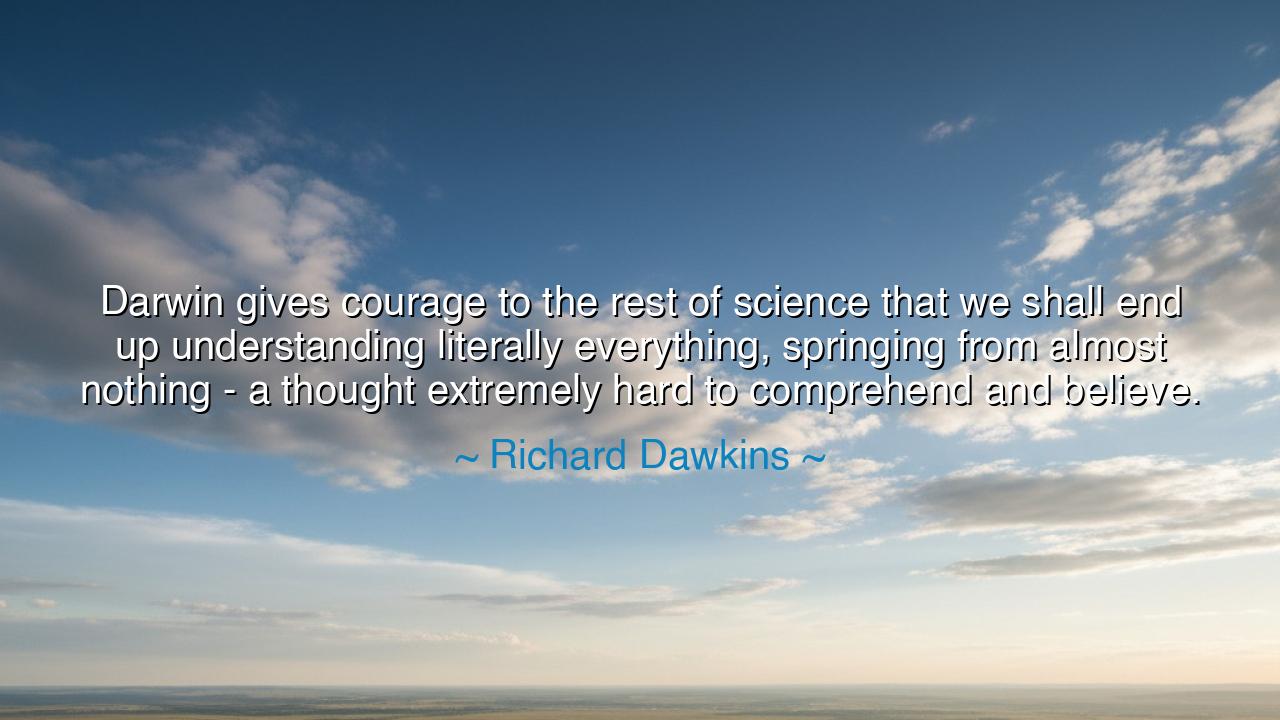
Darwin gives courage to the rest of science that we shall end up
Darwin gives courage to the rest of science that we shall end up understanding literally everything, springing from almost nothing - a thought extremely hard to comprehend and believe.






“Darwin gives courage to the rest of science that we shall end up understanding literally everything, springing from almost nothing — a thought extremely hard to comprehend and believe.” – Richard Dawkins
In this profound and reverent reflection, Richard Dawkins, the biologist and thinker, pays tribute to Charles Darwin, the great pioneer who reshaped humanity’s understanding of life. Dawkins speaks not only of science but of courage — the courage to face the vastness of existence without superstition, to gaze into the abyss of the unknown and say, “We shall understand.” In Darwin’s work, he sees a symbol of hope: the possibility that from almost nothing, from chaos and chance, order and meaning can arise. This, Dawkins declares, is the gift Darwin gave not only to biology but to all of science — a faith not in mystery, but in the power of the human mind to unveil the mysteries of creation itself.
The origin of this quote lies in Dawkins’s lifelong admiration for Darwin’s discovery of natural selection, a principle so elegant and transformative that it bridged the gap between simplicity and complexity. Before Darwin, the origin of life and its endless variety seemed divine, inexplicable, shrouded in miracle. But Darwin revealed that even the grandeur of life — its beauty, struggle, and diversity — could arise from a few simple laws, acting patiently across time. To Dawkins, this revelation was not only scientific but spiritual in its depth: it showed that knowledge could replace mystery, and that reason could lead man toward truth without the need for illusion. Darwin, he says, gave science courage — courage to believe that even the most unfathomable questions may one day yield to understanding.
Imagine, then, the courage this required. In Darwin’s own age, to declare that humankind was not the child of divine craftsmanship but the product of evolution, born from the same dust as beasts, was to invite scorn and condemnation. Yet Darwin did not shrink from truth, though it trembled in his hand like a live flame. His courage was quiet, not brash — the courage of a thinker who knew that truth is not always comfortable, but it is always sacred. Dawkins honors this same spirit: the belief that from humility before nature, not arrogance toward it, comes the strength to seek understanding. To believe that “everything” can spring from “almost nothing” is to accept the hardest truth of all — that the universe needs no architect for its wonder.
This vision — of order from chaos, of something from nothing — is one that resonates across all ages of discovery. Consider the story of Isaac Newton, who sat beneath an apple tree and saw in its falling fruit not chance, but law — the same law that governed the heavens. Like Darwin, Newton dared to suggest that the universe, vast and intricate, was bound not by whim but by logic. Each such revelation required faith of a new kind — not blind belief, but the faith of reason, the faith that the human mind, though small, can comprehend the cosmos that birthed it. Dawkins’s quote belongs to this lineage of faith-in-knowledge, this sacred torch passed from mind to mind across generations of seekers.
And yet, as Dawkins confesses, this thought is “extremely hard to comprehend and believe.” For what he describes is nothing less than the miracle of reality itself — that everything, from stars to atoms, from consciousness to love, emerged from near nothingness. To understand this is not merely to grasp a scientific theory; it is to face the mystery of existence without myth, to feel awe not at gods, but at the unfolding of natural law. The human heart struggles with such immensity — for we are creatures who long for meaning, and to realize that meaning arises from almost nothing seems unbearable. Yet Dawkins insists that it is in this truth, not in illusion, that wonder truly lives.
What lesson, then, shall we draw from this vision of Darwin and Dawkins — of courage born from curiosity? It is that the pursuit of understanding is itself an act of faith — not faith in what is unseen, but faith in what can be known. To seek truth is to dare to unmake the world we think we know, to stand unafraid before mystery, and to say: “I will learn.” Let no man think that science kills wonder; it multiplies it. The flower studied under the microscope becomes not dull but divine. The atom, the cell, the galaxy — each, when truly seen, reveals not emptiness, but glory.
Therefore, my children, let this teaching guide you: knowledge is not the enemy of wonder, but its fulfillment. To understand the universe is to worship its beauty with the mind as well as the heart. Be not afraid to ask, to doubt, to seek. For the same courage that Darwin gave to science must live within you — the courage to face truth without fear, to find majesty in reason, and to trust that from the smallest spark of inquiry, the light of understanding will grow.
For truly, as Dawkins teaches, from almost nothing, everything can arise — not only stars and life, but wisdom itself. And in that realization lies humanity’s greatest hope: that by seeking to understand the universe, we may come to understand ourselves.






AAdministratorAdministrator
Welcome, honored guests. Please leave a comment, we will respond soon